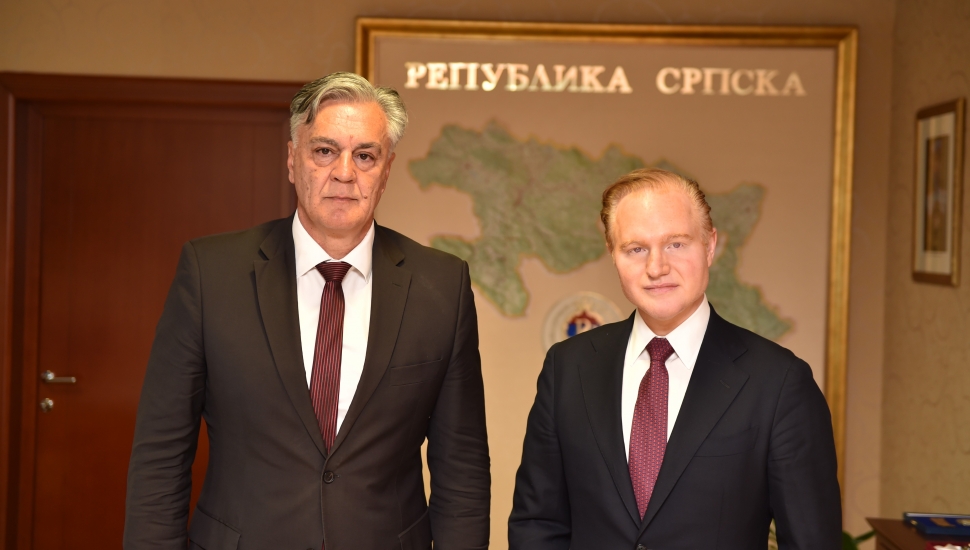This post is also available in: Bosnian
When a US lawyer, Martin De Luca, visited Bosnia’s Serb-led entity, Republika Srpska, in April, the entity’s publicly-funded media outlets reported that he was a member of a US administration team investigating the alleged misspending spending of funds by aid agency USAID in Bosnia and Herzegovina.
De Luca himself said he had a meeting with the Republika Srpska police but could not comment on what they’d discussed, “except that this is an investigation we are working on, which is ongoing, so I cannot comment on the details”.
Pro-government media in Republika Srpska also reported on De Luca’s first visit in February, saying he was part of US President Donald Trump’s team – and that De Luca had said it was unclear how more than $250 million of American taxpayers’ money had been spent in Bosnia.
De Luca did not reply to messages or phone calls directed to the number listed on his office’s website.
But the US law firm Boiles Schiller Flexner, where De Luca is a partner, insisted that he did not describe himself as a US government official.
“Martin De Luca is not an employee of the US government and has never represented himself as a government employee. He is an attorney and partner at BSF, a private law firm. Any reporting to the contrary is inaccurate and should be corrected,” Victoria Scordato, of Boiles Schiller Flexner, told BIRN.
Asked to confirm De Luca’s statement to media in Bosnia and Herzegovina, saying that he came to investigate USAID, Scordato responded: “I can confirm that Mr. De Luca’s statement was accurate. We are not at liberty to discuss more at this time, but we will keep you posted.”
When he first visited Banja Luka in February, De Luca told Republika Srpska media outlets ATV and RTRS that he was probing the spending of funds through USAID.
He added that, over the past four years, it had spent $402 million in Bosnia – and that it was impossible to determine where $250 million of that amount had gone.
Since then, he has appeared in public several times accompanied by Republika Srpska officials and has met Republika Srpska police director Sinisa Kostresevic and the entity’s Interior Minister, Sinisa Karan.
The Republika Srpska Interior Ministry did not respond to BIRN’s inquiry about the meeting with Karan. However, media in Republika Srpska reported that they had discussed “the current political and security situation with a special emphasis on the crisis caused by Christian Schmidt’s decisions”.
Schmidt is the High Representative in Bosnia, the international official responsible for overseeing the peace agreement that ended the 1992-5 war in Bosnia.
His role, powers and activities are controversial in Republika Srpska. Bosnia’s state court earlier this year convicted Republika Srpska President Milorad Dodik of defying Schmidt’s decisions. Dodik faces a jail term and a six-year ban on holding presidential office if the verdict is upheld.
Asked by BIRN to respond to the confirmation that De Luca does not work for the US government, the President of Republika Srpska’s National Assembl, Nenad Stevandic, said: “No comment.”
Ivana Korajlic, director of watchdog organisation Transparency International in Bosnia, said that Republika Srpska officials wanted to give the impression that De Luca was connected to President Trump in order to increase the pressure on local NGOs.
Their goal is “to present non-governmental organisations and all those who received USAID funds as some sort of criminals, of course not mentioning the fact that the largest beneficiaries of those funds were [Bosnian and Republika Srpska] institutions,” Korajlic said.
As the Trump administration clamps down on USAID, which it sees as promoting unacceptably liberal values, Dodik has been pushing legislation in Republika Srpska to muzzle local NGOs and media that expose official corruption and promote transparency and the rule of law.
According to the website of the law firm where De Luca works, he has represented clients before US government agencies such as the Office of Foreign Assets Control, OFAC and the US State Department, as well as the European Union.
He has also advised individuals placed under US sanctions.
Dodik is hoping that Trump’s return to office will eventually result in the lifting of sanctions imposed on him and other individuals and companies from Republika Srpska, mostly for corrupt activities or for supporting Dodik’s secessionist activities.
